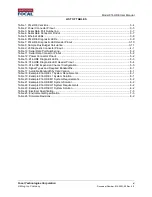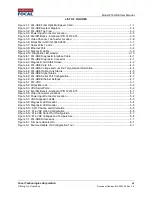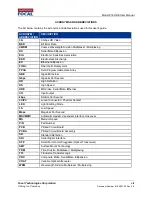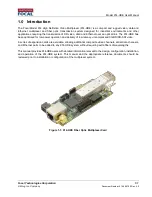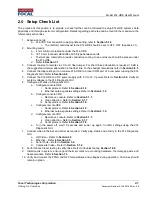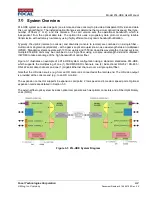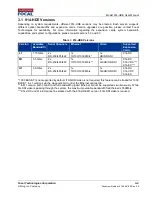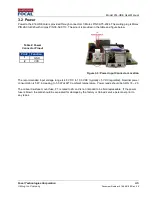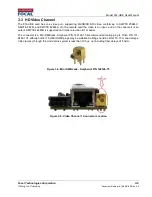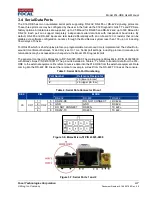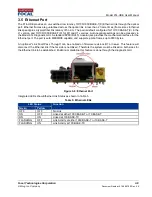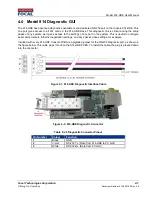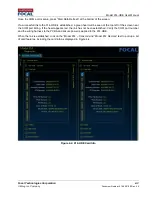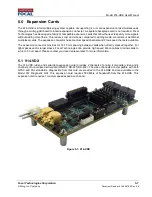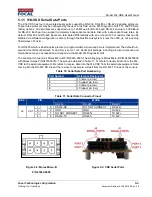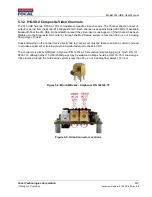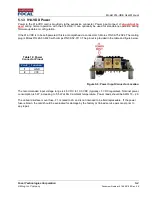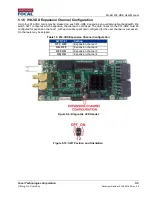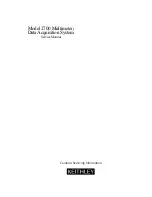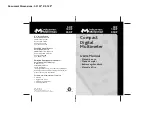
Model 914-HDE User Manual
Focal Technologies Corporation
3-11
A Moog Inc. Company
Document Number: 914-0601-00 Rev. 4.0
3.8 Optics
An SFP or SFP+ transceiver provides the optical interface for the 914-HDE. Many options exist including:
Singlemode or multimode fiber
Bi-directional 1310/1550 nm transceivers (L1 and M1 versions)
Bi-directional 1270/1330 nm transceivers (H1 version)
CWDM wavelengths
Higher or lower optical budgets
Due to the high data rates, singlemode fiber is recommended. Multimode fiber is only suitable for very short
links (< 300m). Typical link budgets for single mode fiber are 20dB for bi-directional single fiber or 24dB for dual
fiber CWDM. Focal Technologies has compatible CWDM modules that can be mounted and stacked with 914-
HDE systems.
Contact the factory for specific part numbers.
3.8.1 Flux Budget Calculation
When specifying an optical system, it is important to analyze system losses and fiber link distances in order to
calculate the required optical configuration. The following table shows a sample flux budget calculation for a
system with multiple ST bushings, a 10km singlemode fiber link and a FORJ. Actual losses can vary widely
from this, each system flux budget calculation must use data based on actual parts in use.
Table 8: Sample Flux Budget Calculation
Component
Uplink (1310 nm)
Downlink (1550 nm)
Unit
Typical Output Power
-1.0
-1.0
dBm
Connector
-0.3
-0.3
dB
Connector
-0.3
-0.3
dB
FORJ
-4.0
-3.0
dB
Connector
-0.3
-0.3
dB
Connector
-0.3
-0.3
dB
Cable (for 10 km length)
-4.0
-3.0
dB
Connector
-0.3
-0.3
dB
Connector
-0.3
-0.3
dB
Total Losses
-9.8
-8.8
dB
Received Power
-10.8
-9.8
dBm
Dispersion Penalty
-1.0
-1.0
dB
Required Receive Sensitivity
-11.8
-10.8
dBm
Typical Receive Sensitivity
-21.0
-21.0
dBm
Available Margin
9.2
10.2
dB
Notes:
Fiber Loss
0.4 dB/km @ 1310 nm; 0.3 dB/km @1550 nm
Connector (ST/PC)
0.3 dB/conn
FORJ Loss (Max.)
4.0 dB
3.8.2 Optical Safety
All lasers used in the 914-HDE system are Class I laser devices per IEC-60825 unless otherwise specified in
installation or configuration drawing. No special control measures or warning labels are required, although any
needless exposure of the eye should be avoided as a matter of good practice, and fibers should never be
viewed with magnifying instruments, e.g. fiber scopes, while optical power is present. Note that the optical
wavelengths are in the infrared range, so not visible, but magnifying instruments can still cause damaging levels
to the eye.

